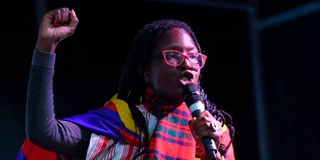Activists call on rich nations to do more in climate change fight

Namibian climate activist Ina-Maria Shikongo speaks to the crowd in George Square in Glasgow, Scotland yesterday, the venue of the UN Climate Change Conference (COP26). African activists have urged rich countries to do more in the fight against climate change.
In Glasgow
Wealthy countries are not doing enough to stop climate change and the world is unlikely to meet its targets in the fight against global warming, African activists have said.
Speaking in Glasgow during the ongoing COP26 summit, the activists said very little progress has been made in efforts to ensure the world takes the much-needed turnaround from the climate crisis.
Although over 100 countries, among them the United States, have so far pledged to cut methane emissions by 30 per cent between 2020 and 2030, the lobbyists said this was not enough.
Kenya’s Mohamed Adow urged the US and other developed countries to walk the talk and commit to ending the use of fossil fuels (coal, oil and gas), which are the biggest causes of global warming.
“We have spent too long talking about emission reductions without highlighting clear steps to end fossil fuel supply. Fossil fuel phaseout and energy transition are clear necessities to avoid the worst of climate change, especially for African countries who bear the least responsibility and worst effects,” said Mr Adow, who is a director at Power Shift Africa.
A report released by civil society organisations on Wednesday in Glasgow, shows that by 2030, the industry is likely to extract twice as much fossil fuels as would be consistent with a 1.5°C rise in temperatures.
The report, Fair Shares Phase Out: A Civil Society Equity Review of an Equitable Global Phase Out of Fossil Fuels, pointed out that the wealthiest countries (US, United Kingdom, European Union countries and Japan) were still not contributing their fair share of global efforts.
Mr Adow said Africa would only accept leadership from the US if it commits to ending fossil fuel production.
Commenting on the contentious issue of financial pledges made by wealthy countries to help poor nations deal with climate change, the activists said the promises were yet to be met.
In 2009, during a meeting in Copenhagen, developed countries, who are majorly to blame for the climate crisis having built their economies on the back of fossil fuels, promised $100 billion per year by 2020.
Impacts of global warming
Additionally, developing countries have demanded compensation, saying in most cases the damage caused by climate change is irreversible.
Ms Ineza Grace, a climate activist from Rwanda, said it was time to address the needs of those suffering from the irreversible and unavoidable impacts of global warming.
“We urge countries to start the process to deliver finance for loss and damage. It is time for our political leaders to address the needs of vulnerable communities already facing climate impacts. It is a matter of urgency and justice,” said Ms Ineza, the director of Loss and Damage Youth Coalition.
Mr Adow called for accountability, saying richer countries had overused their share of the atmospheric carbon budge. He said these countries needed to own up to their climate debt by taking primary responsibility for the pollution.
On Thursday, Britain's COP26 president Alok Sharma praised efforts to phase out fossil fuel financing, suggesting that the end of coal was in sight.
Negotiations process
However, Mr Colin Besaans, a climate activist from South Africa, said most developed countries were leveraging COP26 to make other announcements and commitments that fall outside of the negotiations process.
“While many of these announcements may seem promising on the surface, they are creating dangerous distractions from the commitments within the negotiations that continue to go unfulfilled. We still see Nationally Determined Contributions (NDCs) failing to meet 1.5 degree Celsius warming targets,” he said.
He said there was still lack of accountability to meet financing commitments to vulnerable countries and urged wealthy countries to “put their NDCs where their mouths are”.
“If they are going to make big announcements, add those commitments to your NDCs with clear and robust plans to deliver change, not just offset obligations,” he added.




